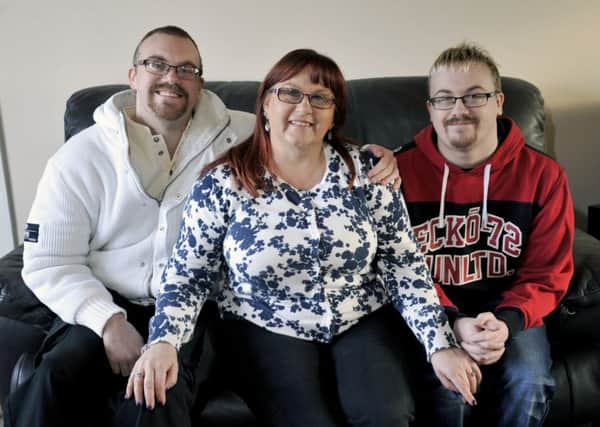Fylde mum wins drug warning fight


Janet Williams, 51, who has epilepsy, was prescribed the drug Epilim by her doctor while she was pregnant with her two sons, Lee, 26, Philip, 24.
Both were born with Fetal Valproate Syndrome, a rare disorder which develops when a fetus is exposed to valproic acid – a key ingredient of Epilim – during the early weeks of pregnancy.
Advertisement
Hide AdAdvertisement
Hide AdMore than 6,300 people are estimated to have been affected by the disorder, which can cause defects, sight problems, poor memory skills, and delays in walking, as a result of mothers taking Epilim during pregnancy – despite health bosses knowing the risks since the drug’s release in 1973.
Mrs Williams, from School Lane, Pilling, who is the co-founder of the Fetal Anti Convulsant Syndrome Association, dedicated to warning epileptic mothers about the dangers of Epilum, said: “It’s bigger than Thalidomide. Around 500 babies in the UK were affected by Thalidomide before it was pulled off the shelves in 1961. No such action has been taken over this despite doctors knowing what it could do.”
She says her sons were slow in learning to walk and talk and are unlikely to ever be able to hold down a full-time job or live independently.
She said: “Their memories are so poor that basic tasks like shopping are beyond them.
Advertisement
Hide AdAdvertisement
Hide Ad“We had to fight to get help for them at school and now I am worried sick about what the future holds for them.
“It is unlikely they will be able to live withoutsupervision and I am not getting any younger.”
In a 1973 document uncovered by Mrs Williams and fellow campaigner Emma Murphy, the committee on safety of medicines stated that the evidence that Epilim was harmful to unborn babies was not sufficiently conclusive, and that warnings should be withheld from the public to prevent “fruitless anxiety”.
It was decided that, though doctors would be made aware of the health risks, written warnings would not be included in package inserts.
Advertisement
Hide AdAdvertisement
Hide AdMrs Williams added: “They knew full well the damage it could cause and they let thousands of pregnant women take it without knowing.
“People aren’t going to ask questions when a doctor prescribes them something. You take whatever medicine they give you. To a normal patient a doctor is like a god.
“Because of them I don’t know what will happen to my sons when I’m gone and there will be no one there to look after them.”
Mrs Williams and Mrs Murphy met with representatives from the Department of Health and Medicines and Healthcare Products Regulatory Agency in a bid to have warning labels added to Epilim’s packaging before taking up their concerns directly with health minister Jeremy Hunt and life sciences minister George Freeman at the Houses of Parliament in December.
Advertisement
Hide AdAdvertisement
Hide AdWith their support, it was agreed to label the drug with a warning: “Valproate can cause birth defects and problems with early development of the child if it is taken during pregnancy. If you are a female of childbearing age you should use an effective method of contraception throughout your treatment.
“Tell your doctor at once if you become pregnant or think you might be pregnant.”
Mrs Williams said: “We don’t want the drug taken off the shelves, we just want people to be able to make an informed choice.”
A Department of Health spokesman said: “Accurate safety information about treatments is absolutely essential.
Advertisement
Hide AdAdvertisement
Hide Ad“Printing warnings on packages is just the latest in a series of measures to highlight the side-effects associated with this drug. Since 2003, regulators have been ensuring that the risks are well understood.”
A spokeswoman for pharmaceutical company Sanofi UK, which manufactures Epilim, said: “The product information relating to Sanofi’s valproate-containing products has at all times appropriately reflected the available scientific and medical knowledge regarding the risks associated with its use, and that information has been provided in line with regulatory processes.
“This information is available to all healthcare professionals, so that it may be used by them in deciding which treatment should be provided to an individual patient in the context of their particular epilepsy condition, medical history and personal circumstances and in providing advice tailored to that patient.”
Government figures estimate that around 350 pregnant women in the UK have been prescribed with Epilim every year since the drug’s release in 1973, and that 30-40 per cent of these pregnancies resulted in the baby being born with Fetal Valproate Syndrome.
Advertisement
Hide AdAdvertisement
Hide AdMore than 15,000 women and 6,000 babies have been affected, with a 2013 episode of Panorama on the BBC asserting that as many as 20,000 children could now be disabled as a result.
Mrs Williams said: “We have won the fight now and the fact that this could save so many lives and help so many families is exactly what we wanted. The only bitterness I have is that we weren’t told earlier.
“Our aim now is to get compensation for the women and children who have been affected.”
An MHRA spokesperson said: “Since it was introduced in 1974 for the treatment of epilepsy the information provided included a warning about the possible risk of birth defects.
Advertisement
Hide AdAdvertisement
Hide Ad“As with all medicines it has been kept under constant review and as new data has become available on the risks associated with valproate in pregnancy the warnings in the information provided with the medicine have been updated.”